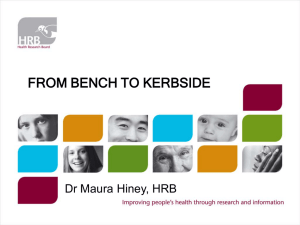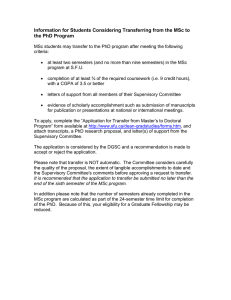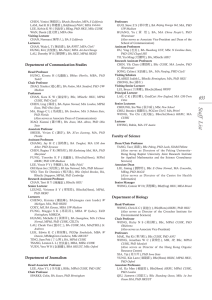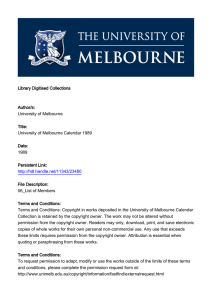Example of MODULE detail: Title of Module (please add any codes
advertisement
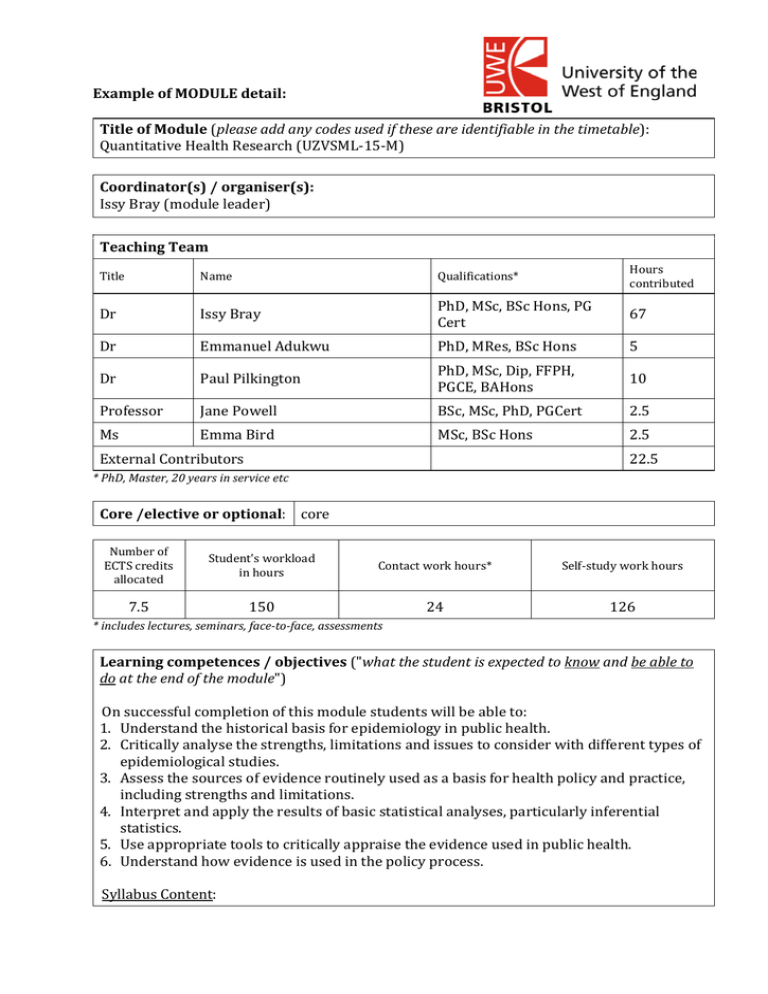
Example of MODULE detail: Title of Module (please add any codes used if these are identifiable in the timetable): Quantitative Health Research (UZVSML-15-M) Coordinator(s) / organiser(s): Issy Bray (module leader) Teaching Team Title Name Qualifications* Hours contributed Dr Emmanuel Adukwu PhD, MRes, BSc Hons 5 Dr PhD, MSc, BSc Hons, PG Cert Issy Bray Dr Professor Ms PhD, MSc, Dip, FFPH, PGCE, BAHons Paul Pilkington Jane Powell BSc, MSc, PhD, PGCert Emma Bird MSc, BSc Hons External Contributors * PhD, Master, 20 years in service etc 67 10 2.5 2.5 22.5 Core /elective or optional: core Number of ECTS credits allocated 7.5 Student's workload in hours 150 Contact work hours* * includes lectures, seminars, face-to-face, assessments 24 Self-study work hours 126 Learning competences / objectives ("what the student is expected to know and be able to do at the end of the module") On successful completion of this module students will be able to: 1. Understand the historical basis for epidemiology in public health. 2. Critically analyse the strengths, limitations and issues to consider with different types of epidemiological studies. 3. Assess the sources of evidence routinely used as a basis for health policy and practice, including strengths and limitations. 4. Interpret and apply the results of basic statistical analyses, particularly inferential statistics. 5. Use appropriate tools to critically appraise the evidence used in public health. 6. Understand how evidence is used in the policy process. Syllabus Content: • • • • • • • • • • History of epidemiology and our understanding of disease causation in populations. Characteristics, strengths and weaknesses of epidemiological studies. Basic statistics – descriptive and inferential. Introduction to statistical tests, including parametric and non-parametric. Controlling for bias and confounding in epidemiological studies. The concept of evidence-based policy and practice. Hierarchies of evidence. Tools and techniques in critical appraisal. The dissemination and communication of evidence. Ethical issues in the use of data. Module level timetable - indicate the timing of the teaching sessions from the previous teaching year: 13:30-16.30, Thursdays, semester 1 (over eight weeks) Pedagogic/teaching methodology: Scheduled learning includes lectures, seminars, groupwork and workshops. Independent learning includes hours engaged with essential reading, workshop preparation, assignment preparation and completion and self-directed study. Technology Enhanced Learning supplements all taught sessions, where students are provided with access to essential and supplementary learning materials via Blackboard. Module support is provided via email and via Blackboard. Podcasts or video are used to supplement lecture input. Assessments used: A two hour examination including MCQs and short answer questions to assess the candidates knowledge and understanding of epidemiological concepts and quantitative techniques. This includes a structured critical appraisal of an abridged, unseen research paper, and interpretation of the statistical results. The exam assesses all Learning Outcomes of the module. The assessment details are published in the module handbook and on Blackboard at the start of the module. Weeks required and place in academic calendar: Thursdays, 13:30-16.30, weeks beginning 22/09/2014-10/11/2014 Number of weeks 8 Week number 9-16


